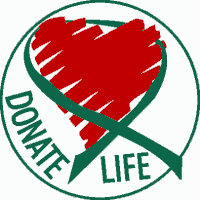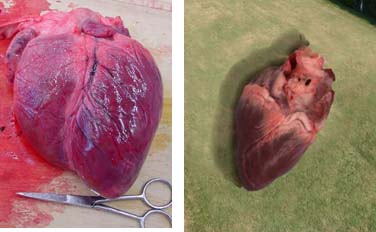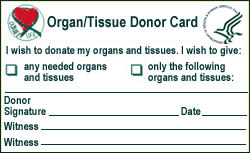- Augusta University
- Colleges & Schools
- Medical College of Georgia
- Surgery
- Transplant | Surgery
- Tissue Donor Services
Tissue Donor Services

The Augusta University Tissue Donor Services (TDS) is affiliated with the Musculoskeletal Transplant Foundation (MTF), an AATB accredited tissue bank in the United States, with 26 member programs.
New surgical techniques, improvements in preservation, and improved immunosuppression have contributed to recent increases in the success of transplantation. Transplantation of vital organs has become a common treatment of individuals suffering from end stage diseases of the kidney, heart, liver, lung, small bowel, and pancreas. The transplantation of bone, skin heart valves, corneas, and other tissues can improve the quality of life for thousands each year. The major limiting factor in the transplantation of organs and tissues is the availability of donors.
Although increased efforts in the areas of public and professional education have helped to increase the number of organ and tissue donors, many potential donors are still not referred by health care providers, though polls have found that as many as 80% of Americans are willing to donate their organs and tissues after death.
Augusta University Tissue Donor Services is a hospital-based tissue procurement agency, responsible for coordinating procurement of transplantable tissues from hospitals in eastern and southern Georgia, and Aiken county, South Carolina. The office of the program is the Augusta University and Clinics in Augusta. The program functions as a full-service tissue recovery agency providing all aspects of the donor process for tissue donation.
As transplantation has become a medically acceptable treatment for patients with many
diseases, the scope of tissue donation programs has broadened. For most recipients,
the only opportunity they will have for an improved quality of life is the donation
of tissue by another at death.
Advances in medicine in recent years have led to the use of human allograft tissue for the replacement of diseased or injured tissues. Thousands of individuals are helped to recover from numerous medical problems through the transplantation of corneas, heart valves, veins, bone, skin, dura, fascia, and tendons or, ligaments.
The use of cadaver skin, as a temporary dressing to treat massive burn victims, is the best treatment currently available for many patients. approximately 100,000 skin grafts are performed annually with the assistance of skin made available by skin banks throughout the country. The need is estimated to exceed the supply by six to seven times that currently donated.
Bone transplantation is recorded in history as early as 1682. Over 200,000 bone grafts are performed annually to treat many orthopaedic and neurosurgical, maxillofacial problems. Cadaver bone and soft tissue transplantation can be performed with success comparable to the use of autografts. It is also recognized that allograft tissue can reduce post-operative pain, shorten hospitalizations, and decrease the cost involved.
The use of cardiac homografts for the treatment of valvular disease and congenital anomalies has become increasingly popular among cardiothoracic surgeons. Saphenous veins and femoral veins has also become increasingly popular. These tissues provide a new outlook for the treatment of certain cardiovascular disease processes.
Because demand far exceeds supply, the referral of potential tissue donors is vital to the survival of many waiting recipients. Saphenous veins and femoral veins have also become increasingly popular. These tissues provide a new outlook for the treatment of certain cardiovascular disease processes.
Because demand far exceeds supply, the referral of potential tissue donors is vital to the survival of many waiting recipients. Augusta University Tissue Donor Services is responsible for working with hospitals and health care providers to allow the donor process to be carried out in a dignified manner.
 Tissue Donor Services is a separate section within the Department of Surgery. Tissue
Donor Services' fully supports all efforts to ensure donation of vital organs from
donors meeting organ donation criteria. any potential organ donor identified by TDS
is referred to LifeLink of Georgia, the current federally designated Organ Procurement
Organization (OPO) serving the area. Medical education and research are also supported
by the distribution of donated tissues to research programs when transplantation is
precluded.
Tissue Donor Services is a separate section within the Department of Surgery. Tissue
Donor Services' fully supports all efforts to ensure donation of vital organs from
donors meeting organ donation criteria. any potential organ donor identified by TDS
is referred to LifeLink of Georgia, the current federally designated Organ Procurement
Organization (OPO) serving the area. Medical education and research are also supported
by the distribution of donated tissues to research programs when transplantation is
precluded.
Every person should be considered a potential tissue donor. Criteria for donation vary depending on the specific tissue. As transplantation success rates increase, donor criteria will likely be broadened. All criteria should be considered general. Specific evaluation of a potential donor depends on age and circumstances at the time of death. These criteria should therefore be used only as guidelines.
For additional information, please contact either of the following Certified Tissue Bank Specialist: